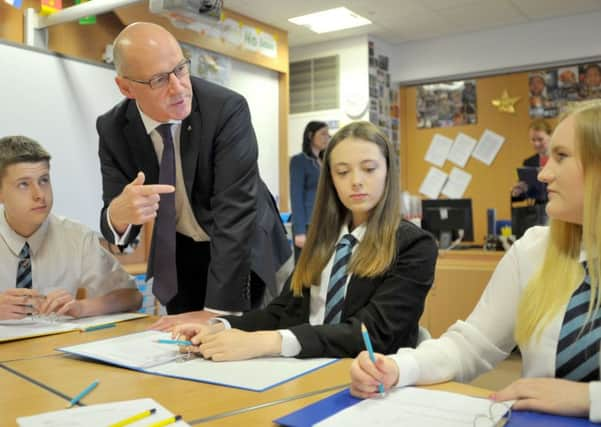Dani Garavelli: Clock ticking to restore spirit of Excellence


A range of pedagogical experts, including frontline teachers, have been warning for years that the cack-handed way in which the policy was being implemented was having a negative impact. They believe the bureaucratic and assessment-heavy system we have ended up with is diametrically opposed to the original CfE vision, which was to liberate teachers and create independent and successful learners.
Until May – when Nicola Sturgeon appointed John Swinney as the new education secretary – the Scottish Government did little to address those concerns. Only now, when the decline in standards is already entrenched and Scotland is being compared unfavourably with South Korea, does it appear to be acknowledging the scale of the problem.
Advertisement
Hide AdAdvertisement
Hide AdAlmost as disheartening as the SNP’s inertia is the Tories’ predictably knee-jerk response. No sooner had the survey results been published than Ruth Davidson was calling for the entire CfE project to be “put on probation”. “If standards are declining because of CfE, the SNP has to explain why it is sticking by it,” she said. Yes, that’s the answer. Let’s jettison the policy we’ve spent the past 15 years developing. Because there’s nothing beleaguered Scottish teachers need more right now than a bit more instability.
This is – in a nutshell – everything that’s wrong with contemporary politics. A bold new initiative doesn’t pan out as planned and instead of doing the hard thing – listening to critics, working out where it’s going wrong, and trying to get it back on track – one party spends years in denial and the other wants to write the whole thing off.
What is needed in the face of the latest setback is cool heads and a bit of perspective. There is no getting away from the fact the rankings – which see Scotland scoring an “average” in all three fields (when they scored “above average” in reading and science in 2012) – are a blow, but not everyone believes the PISA survey is the most useful measure of attainment; it is not entirely fair, after all, to compare Scotland with countries in eastern Asia where children spend several hours a day with private tutors.
On a positive front, the bulk of educational experts, including the Organisation for Economic Development (OECD), the body responsible for the PISA rankings, still believe the philosophies that lie behind CfE – greater teacher autonomy, a broader educational base, and interdisciplinary learning – to be of value.
The implementation may have been disastrous, but many of the flaws have already been identified: a lack of clarity around how it should be delivered, not enough time out of the classroom for teachers to share ideas, and an increase in form-filling and assessment for assessment’s sake.
The freedom to adopt different approaches has led to a disparity in the number of subjects taken in fourth year, with some schools offering pupils a maximum of six National Fives and others eight; in those schools where they offer only six, there has been a narrowing of choices and a drop in those taking a modern language.
There have also been issues with the introduction of the new qualifications, with a trend towards “teaching to the test” and claims that the National Four, which has no exam attached, is looked down on by both pupils and employers.
Some of these problems are finally being confronted. Earlier this year, Swinney pledged to crack down on bureaucracy and scrap the much-hated “unit assessments” which were taking up valuable teaching time in fourth and fifth year. Sturgeon has also set up a £100 million attainment fund to be channelled to schools in the areas of greatest need.
Advertisement
Hide AdAdvertisement
Hide AdAt the same time, the party is determinedly pressing ahead with more contentious measures. It remains committed to the reintroduction of standardised assessments in primaries, despite warnings that doing so will result in league tables and intensify the middle-class drift towards “better” schools. It also intends to “empower” headteachers and create regional education boards to encourage collaboration between local authorities, though some fear this is the first step towards removing schools from council control.
You could argue all day about the pros and cons of giving schools autonomy, but the one thing the PISA survey makes clear is that the countries that do best are the ones that invest most heavily in teaching. Not the ones that splash the most cash, but the ones where the cash that’s splashed finds its way into the classroom.
This is significant. In the past, the SNP’s approach has often been to cast teachers as change-resistant whingers standing in the way of progress; thus, their concerns about the implementation of CfE could be dismissed as further evidence of their inflexibility. But teachers are our greatest resource: motivate them, support them, give them space for development, and you might just get the best out of them. Most crucially: respect their expertise. They’re the ones who are tasked with delivering CfE on a daily basis; accept they know what they’re talking about.
Sturgeon insists narrowing the attainment gap is her top priority. Quite right too. It is disgusting that children born into deprivation continue to have their life prospects circumscribed from birth when a good education ought to be offering a ladder up.
To ditch CfE at this stage, when its principles are sound and so much has been invested in it, would be counterproductive. But last week, Keith Topping, professor emeritus of education at the University of Dundee, said we had just five years to save it; after that it would be abandoned as a lost cause. Having squandered so much time already, the SNP had better get cracking.